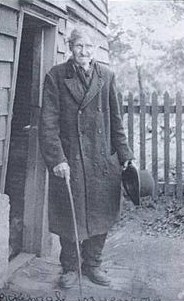George Pickingill
| George Pickingill | |
|---|---|

Photograph allegedly of Pickingill taken in the late nineteenth or early twentieth century.
|
|
| Born | Circa 1816 Hockley, Essex |
| Died | 10 April 1909 Canewdon, Essex |
| Occupation | Cunning man, farm labourer |
| Spouse(s) | Sarah Ann Bateman (m. 1856–87) |
| Children | Martha Ann, Charles Frederick, Mary Ann, George |
| Parent(s) | Charles Pickingill, Susannah Cudner |
George Pickingill (c. 1816 – 10 April 1909) was an English farm labourer who lived and worked in the village of Canewdon in the eastern English county of Essex. Widely considered to be a cunning man, or vocational folk magician, he reportedly employed magical means to offer cures for ailments and to locate lost property, although was also alleged to have threatened to place curses on people.
Born into a rural working-class family, Pickingill grew up in Hockley, Essex and was baptised into the Church of England. Working as a farm labourer, in 1856 he married Sarah Ann Bateman in Gravesend, Kent. The couple moved back to Essex, settled in Canewdon and had four children. Pickingill's wife died in 1887, and in later life he attracted limited press attention for his claim to be one of the oldest men in England. These claims also appeared in his obituaries, although were later shown to be incorrect.
Pickingill was brought to wider public attention in the early 1960s by the folklorist Eric Maple. As part of his research into beliefs regarding folk magic and witchcraft in nineteenth-century Essex, Maple had interviewed a number of Canewdon residents and collected their stories about Pickingill and his reputation as a cunning man. According to their accounts, Pickingill attracted visitors from around Essex seeking his magical help, for which he did not charge. They attributed to him the power to control animals, to command imps to do his bidding, and to wield power over either six or nine malevolent witches who lived in Canewdon. It was also claimed that he was able to coerce assistance and beer from local residents by threatening to place a curse upon them or their belongings. Although it has been suggested that local people were inventing claims to please Maple, many of which were based on older tales regarding the Essex cunning man James Murrell, subsequent research by historian Ronald Hutton has confirmed aspects of the folklorist's original accounts.
...
Wikipedia
